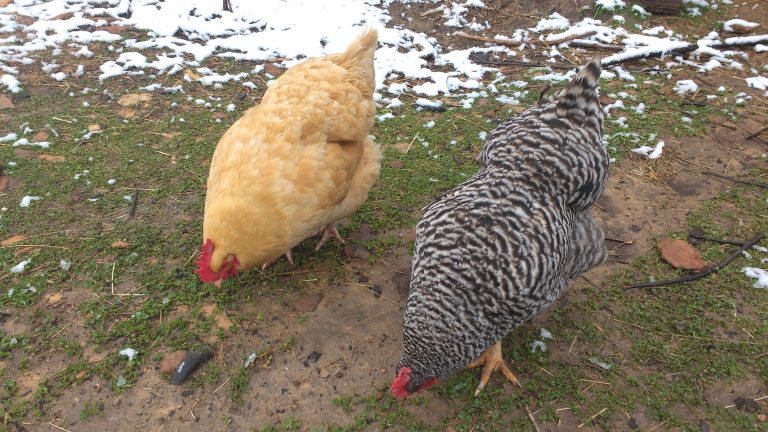Can your laying hen crow? OK—so, that’s really a trick question. If your laying hen is crowing, then she’s already undergone a hormonal change that is causing her to display rooster-like qualities. And since roosters don’t lay eggs … guess what? Neither will your crowing hen.
I only know this because a few days ago, I was in my goat barn, milking one of my goats, when I heard this poor, strangled little rooster crow coming from just outside the barn. I set down my milk pail and headed toward the sound, expecting to find one of the neighbor’s young roosters in my yard.
Instead, there stood my fattest Buff Orpington hen with her head cocked back, crowing like a rooster.
Yes, this is a true story. And I have a video to prove it.
Apparently, spontaneously occurring transgender chickens are only slightly out of the ordinary in nature.
The hen in question is used to being around roosters. However, she’s getting on a bit in age. So, recently, I decided to put her, and a few of my other older chickens, out to pasture (so to speak). As my older gals don’t lay much and I prefer to hatch eggs from my younger ladies, I wanted my long-laying ladies to have a nice retirement without having to worry about all those younger men hitting on them in the chicken yard.
Buffy, being my biggest, most robust older hen, took it upon herself to take charge of this newly formed flock of old laying ladies.
A few days after I moved her to the new coop, she started roosting higher than the other gals. Before this, she was a middle-bar kind of hen. Her new roosting habits did seem a bit odd to me, but not yet worrisome.
Next, she started making those “chook, chook” sounds to call her sisters over when she found something good to eat. And the other girls actually came running when she called! Those other ladies are usually quite independent. The fact that they listened to her was a clear sign that flock dynamics were changing.
That sly girl used this trick on me a time or two to get me to pick her up and pet her. I thought it was so cute, I actually encouraged it by making the “chook, chook” sound to her so she would then make it back to me.
Little did I know, these small changes were actually the precursors to her transition into a full-blown crowing rooster-hen.
Now, if she were a younger lady with lots of egg production in her future, I might put her back in with the roosters to try to reverse the course of this transgender trending. However, I happen to be one of those people who thinks that once you reach a certain age, you should just be free to be who you are.
So, Buffy is now Bufford, my handsome and beautiful crowing hen. I may end up regretting my decision to accept her as she is if she starts growing spurs … which also apparently happens from time to time!
How about you? Have you ever had a hen turn rooster?

Tasha Greer is a regular contributor to The Grow Network and has cowritten several e-books with Marjory Wildcraft. The author of “Grow Your Own Spices” (December 2020), she also blogs for MorningChores.com and Mother Earth News. For more tips on homesteading and herb and spice gardening, follow Tasha at Simplestead.com.









COMMENTS(10)
Wow. So weird and interesting. Thanks for the info. And if you have a rooster lay an egg, do tell us, okay?
According to Louise’s comment (see below), it’s illegal for a rooster to lay an egg. The Rooster of Basel was burned to death for it! So, if one of my sweet roosters lays an egg, I’ll probably keep that info to myself and save my rooster that fate! Thanks for reading!
wow. have heard of this, but never actually seen,…or heard…, it!
I hadn’t seen it either until this hen. But I’ve talked to a lot of long-term chicken keeping friends and it apparently happens quite a bit. It seems more common among my friends with larger flocks. But that might just relate to having better odds of coming across a chicken with this condition.
I don’t believe it was so much a “transition into a full-blown crowing rooster-hen,” but rather her change in rank. This hen’s crowing, just like a prior silence rooster, is quickly heard when they become at the top of there pecking order.
An infection of the hen’s sexual organs is often at play and may cause other rooster features. Returning her to the roosters will not change who she is, it will only change her rank, which will upset her and likely stop her crowing. She may also stop crowing if there is an infection that clears up. Moving to the top of the pecking order will usually make even the most docile rooster very aggressive when he starts crowing. Whereas, a hen may not get aggressive till later or perhaps never.
Buffy is not the first Buff Orpington hen to crow, so there may be a gene issue with no infection. But in any case Buffy is still Buffy and might still lay eggs.
You may not know that it’s illegal for a rooster to lay eggs. The Rooster of Basel, in the city of Basel, was burnt to death for doing so in 1474. And another was found guilty in Switzerland and also burned to death in 1730. This is because of the risk of a Cockatrice or a Basilisk if a rooster egg was to hatch.
Louise – Thanks for the great info!
Buffy is thankfully still a sweet little chicken. She’s packed on some pounds and is now much larger than my other hens. It also looks like her feathers are changing. A neighbor of mine said she had a hen grow rooster-like tail feathers too. So, I am expecting that to happen next.
Buffy has also started dropping her wing to try and “court me” though she’s not very aggressive about it!
Buffy has definitely stopped laying. She was laying about 2 eggs a week right up until two weeks before she started crowing. I had talked to some other chicken keepers and read a lot of accounts of people with crowing hens and they had all stopped laying, so I am glad to hear that some hens might still lay while crowing.
Also, thanks for the history lesson. I had no idea! Poor Rooster of Basel – I would have wished him a more humane death…
Sounds like you’ve got lots of experience and love chickens. Thank you for sharing your knowledge!
We really need an article on raising basilisks for meat and eggs. 😉
“If your laying hen is crowing, then she’s already undergone a hormonal change that is causing her to display rooster-like qualities. And since roosters don’t lay eggs … guess what? Neither will your crowing hen.”
My experience is different. I’ve had many crowing hens over the years, and about half my roosters (head of the roost – like the mayor of the flock) have been female (a boy chicken is a cock or cockerel). All of my crowing hens lay eggs. I know this because we separate out potential non-layers a few times a year to see if they are producing eggs or would like to come to our place for a meal of coq au vin.
I think it’s interesting the way that the language around chickens has changed in the last few years. We used to have words for different biological sexes (male/female, cock/hen) and words for a social position like (rooster/pullet/chick)
Hey fibrefarmer – Thanks so much for sounding in on this!
When I wrote this post, I had read a lot of other posts about crowing hens and everything I came across pointed to crowing hens not laying anymore. I also talked to a couple commercial laying hen flock managers who told me they automatically cull crowing hens because they stop laying. Since my crowing hen had also stopped laying, it confirmed what I had read and heard.
But, I am glad to know that crowing hens can still lay! My hen gets a pass either way because she’s a bit of a pet. But, for others who run up against this issue, maybe they’ll have your experience rather than mine!
Also, on the terminology front, I think a lot of people do still use those terms. Though, there’s often differences of opinion on where the age breaks fall. I also have goats. In my area, does are nannies and bucks are billies. They don’t have defined descriptors for male and female goats not ready to breed, so they just call those kids. Having good descriptors would be helpful. Somehow though we always manage to get our message across.
Again, thank you so much for sharing your experience and giving hope to other people with crowing hens!
Tasha
I also have a Buff Orp who has started crowing in recent weeks. She isn’t particularly dominant, she’s an older bird, hasn’t laid eggs for at least a couple years, and is funnier than all get-out to watch. At first she looked surprised and awkward. Now she seems a little more used to it. Last year she had been looking a little old, and then she looked kind of young again. She does in fact have a deeper golden color and more shine, tail feathers and comb more like a rooster, plus the beginnings if itty-bitty spurs. But since there was never a time where she disappeared, or a sudden change in appearance from one day to the next, I conclude that hormones are doing their thing. Less than 30% of our aging flock actually lays eggs anymore, we’re fine with them being mobile lawn ornaments, and this is just another aspect to enjoy.